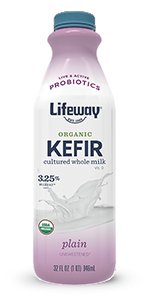Mac and cheese, but make it healthy(ish). Blend in butternut squash to make a classic comfort food a little more nourishing – just one cup of this colorful squash adds in close to 300% of your daily recommended value of Vitamin C. Swapping in a few splashes of creamy kefir instead of milk is a healthier way to enjoy this updated classic without compromising the rich, cheesy flavor!
Cultured Dairy: The Nutrition Benefits You Actually Need to Know
With increasing research linking the correlation between probiotics, gut health, and immunity, it’s no secret that the integrity of our gut is vital to our health. Although additional factors such as stress, antibiotic usage, and individual health conditions can contribute to the condition of our gut, a focus on healthy food choices is one of the easiest ways to support the microbiome.
Several studies have shown a strong association between the gut-brain-microbiota. Probiotics introduced to the gut have been found to support immunity, improve allergies, and improve digestion.
Studies have shown that reduced diversity of healthy gut bacteria during early years is associated with an increase in food allergies during school age years. In addition, kefir made from whole fat milk helps absorb key nutrients such as Vitamins A, D, E, and K. Vitamin K is important because it helps your bones absorb calcium. It’s important to know that kefir contains a special trio: vitamin D, K, and calcium – all three crucial elements to support bone health.
Prebiotics + Probiotics = a Healthy You
Prebiotics are non-living, non-digestible carbohydrates naturally found in a variety of foods. Your body actually can’t digest prebiotics, so they’re what probiotics feed off of to remain actively working in your digestive system. They help the digestive system by promoting the growth of good bacteria. Prebiotics and probiotics work together in balance to make sure our digestive system stays on track and regular. Research has found that consuming a variety of prebiotic and probiotic food sources may improve your body’s natural functions, including both your immune and digestive system.
Ingredients
- 8 ounces medium pasta shells
- 6 slices bacon, diced
- 2 tablespoons unsalted butter
- 3 cloves garlic, minced
- 1 shallot, minced
- 2 tablespoons all-purpose flour
- 1 1/2 tablespoons finely chopped sage
- 1 1/4 cups half and half
- 1 cup Organic Whole Milk Plain Kefir
- 1 (15-ounce) can butternut squash puree
- 1 teaspoon Dijon mustard
- 3 cups shredded extra-sharp cheddar cheese
- salt and black pepper, to taste
- 2 tablespoons chopped fresh chives
Directions
- In a large pot of boiling salted water, cook pasta according to package instructions; drain well.
- Heat a large skillet over medium high heat. Add bacon and cook until brown and crispy, about 6-8 minutes. Drain excess fat; transfer bacon to a paper towel-lined plate.
- Melt butter in the skillet. Add garlic and shallot, and cook, stirring frequently, until fragrant, about 2-3 minutes.
- Whisk in flour and sage until lightly browned, about 1 minute.
- Gradually whisk in half and half, whole milk kefir, butternut squash and Dijon. Bring to a boil; reduce heat and simmer, stirring occasionally, until reduced and slightly thickened, about 3-4 minutes.
- Stir in pasta and cheese until melted, about 2 minutes; season with salt and pepper, to taste.
- Serve immediately, garnished with bacon and chives, if desired.

